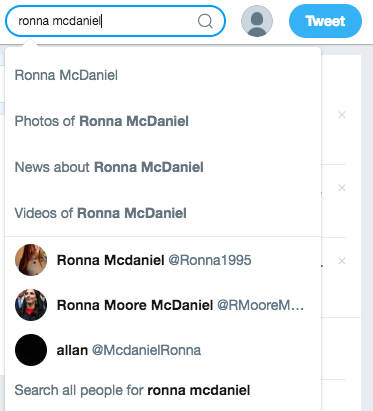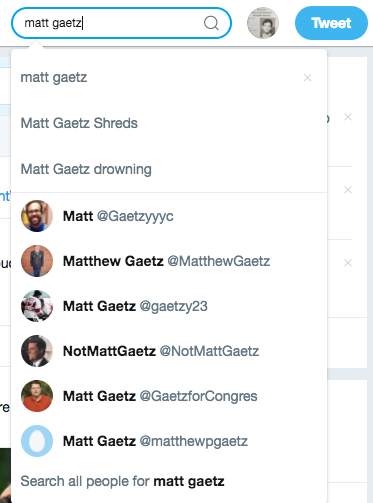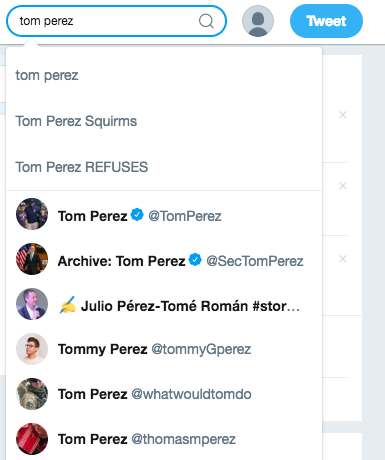UPDATE: July 26, 10:00 AM: Twitter appears to have adjusted its platform overnight to no longer limit the visibility of some prominent Republicans in its search results. Read more here.
Original story:
Twitter is limiting the visibility of prominent Republicans in search results — a technique known as “shadow banning” — in what it says is a side effect of its attempts to improve the quality of discourse on the platform.
The Republican Party chair Ronna McDaniel, several conservative Republican congressmen, and Donald Trump Jr.’s spokesman no longer appear in the auto-populated drop-down search box on Twitter, VICE News has learned. It’s a shift that diminishes their reach on the platform — and it’s the same one being deployed against prominent racists to limit their visibility. The profiles continue to appear when conducting a full search, but not in the more convenient and visible drop-down bar. (The accounts appear to also populate if you already follow the person.)
Videos by VICE
Democrats are not being “shadow banned” in the same way, according to a VICE News review. McDaniel’s counterpart, Democratic Party chair Tom Perez, and liberal members of Congress — including Reps. Maxine Waters, Joe Kennedy III, Keith Ellison, and Mark Pocan — all continue to appear in drop-down search results. Not a single member of the 78-person Progressive Caucus faces the same situation in Twitter’s search.
“The notion that social media companies would suppress certain political points of view should concern every American,” McDaniel told VICE News in a statement. “Twitter owes the public answers to what’s really going on.”
Presented with screenshots of the searches, a Twitter spokesperson told VICE News: “We are aware that some accounts are not automatically populating in our search box and shipping a change to address this.” Asked why only conservative Republicans appear to be affected and not liberal Democrats, the spokesperson wrote: “I’d emphasize that our technology is based on account *behavior* not the content of Tweets.”
Twitter directed VICE News to a May 15 blog post that explained the company’s new approach to combating “troll-like behaviors.” After making changes to its platform, the company said that “[t]he result is that people contributing to the healthy conversation will be more visible in conversations and search.”
Twitter did not respond to a follow-up question.

Twitter’s troll hunt, however, has ensnared some of the most prominent Republicans in the country. Type in the names of McDaniel, conservative members of Congress like Reps. Mark Meadows, Jim Jordan, and Matt Gaetz, and Trump Jr.’s spokesman Andrew Surabian, for example, and Twitter’s drop-down search bar does not show their profiles. The search menu also does not display the verified profile of Rep. Devin Nunes of California, only his unverified one that he seldom uses to post.
That limits their visibility and the ease of finding their profiles compared to their liberal counterparts.
The company’s drop-down search bar has also been excluding several prominent racist figures on the alt-right, such as Jason Kessler, who organized last year’s white nationalist rally in Charlottesville, Virginia. The platform has also demoted a smattering of far-right figures like Mike Cernovich, as Gizmodo reported earlier this week.
But the rationale determining which accounts auto-populate in search results and which don’t is unclear. InfoWars and its leader Alex Jones have not been demoted despite often spreading false news and right-wing conspiracy theories, for example. Republican Rep. Steve King — who has tweeted that immigration should be limited because “we can’t restore our civilization with somebody else’s babies” — also appears to be unaffected by this change to the company’s search function. He retweeted a self-proclaimed “Nazi sympathizer” last month and declined to take it down when notified of the person’s history.
“This isn’t evidence of a pattern of anti-conservative bias since some Republicans still appear and some don’t. This just appears to be a cluster of conservatives who have been affected,” said New York Law School Professor Ari Ezra Waldman, who testified at the House Judiciary Committee’s April hearing on social media filtering and is the author of Privacy as Trust: Information Privacy for an Information Age. “If anything, it appears that Twitter’s technology for minimizing accounts instead of banning them just isn’t very good.”

Even if the shadow banning is more of a bug than a feature, the demotion of these prominent Republicans could be a political liability for the social media company.
Conservatives in and out of Congress have been claiming for months — with varying amounts of evidence — that Big Tech companies are censoring voices on the right. The Republican-led House Judiciary Committee convened not one but two hearings on the subject in recent months, including one with pro-Trump social media stars Diamond and Silk, who argued that Facebook had been intentionally diminishing the reach of their content. The second hearing went down just last week where representatives from Twitter, Google, and Facebook were subjected to grilling by conservatives.
“It is curious that these allegations would arise the week following Congressman Gaetz’s heated exchange with Twitter senior executives before the House Judiciary Committee,” a spokesman for Gaetz told VICE News.
The allegations of bias haven’t been limited to Congress either. McDaniel and President Donald Trump’s 2020 campaign manager Brad Parscale wrote a letter to Facebook and Twitter in June asking for the companies to conduct public reviews of potential bias against conservative content on the platform.
“We are alarmed by numerous allegations that Facebook has blocked content from conservative journalists and groups, and Twitter has hidden such content from conservative users’ followers,” they wrote. An RNC spokesperson told VICE News that Twitter has yet to respond to McDaniel but that Facebook reached out to set up a meeting.

Democrats, for their part, have largely rolled their eyes at conservative claims of discrimination. At Diamond and Silk’s hearing in April, the committee’s top-ranking Democrat Jerrold Nadler called the idea of Big Tech censorship of conservatives a “hoax” and a “tired narrative of imagined victimhood” that was eclipsing other priorities like election security and online privacy.
But Facebook and Twitter have appeared to take the conservative criticism seriously and have arranged a series of meetings and public reviews aimed to build up trust with influential figures on the right. Despite some evidence that Diamond and Silk were exaggerating their claims, Facebook publicly apologized to the duo in front of Congress last week.
And Twitter CEO Jack Dorsey convened a D.C. dinner on June 19 with prominent conservatives including White House advisor Mercedes Schlapp, Fox News commentator Guy Benson, and tax activist Grover Norquist, as the Washington Post first reported.
But the black box of the platforms’ changes still has conservatives wary. “This type of opaque behavior by social media companies is exactly why conservatives are speaking out and demanding more transparency and accountability,” House Majority Leader Kevin McCarthy of California told VICE News in a statement.
“The bias has to stop.”
Follow Alex Thompson on Twitter at @AlxThomp.
Cover image: Republican National Committee chairwoman Ronna Romney McDaniel, speaks at a fundraiser at Cipriani in New York, with President Donald Trump on Dec. 2, 2017. (AP Photo/Susan Walsh)




